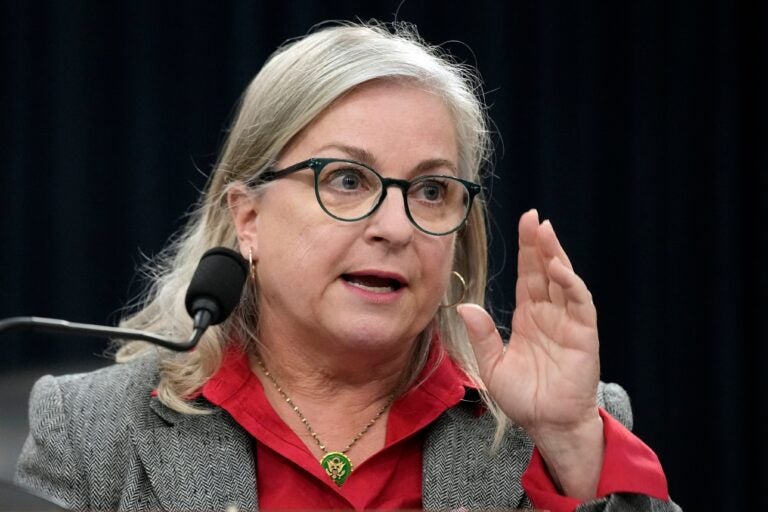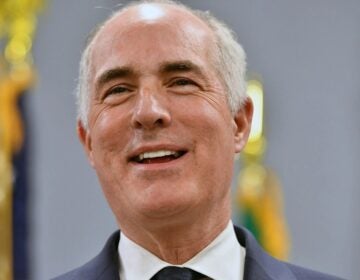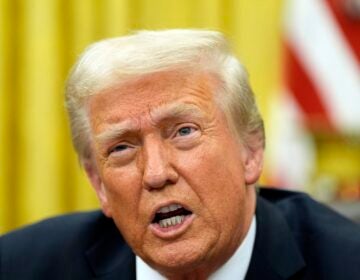Due Diligence: Reproductive health takes top billing as issue in race for president
Donald Trump and Republicans are trying to distance themselves from anti-IVF proposals as Democrats work to pin them to fetal personhood laws.

Rep. Susan Wild, D-Pa., speaks during an event on Capitol Hill in Washington, Wednesday, Feb. 14, 2024. (AP Photo/Susan Walsh)
What questions do you have about the 2024 elections? What major issues do you want candidates to address? Let us know.
Last week, Republican presidential candidate Donald Trump announced that he supports making in vitro fertilization (IVF) available to everyone for free.
“I’m announcing today in a major statement that under the Trump administration, your government will pay for — or your insurance company will be mandated to pay for — all costs associated with IVF treatment,” he said at a town hall in Michigan. “Because we want more babies, to put it nicely.”
Critics on both sides of the partisan aisle were quick to point out flaws in the proposal, particularly related to how expensive it is. U.S. Sen. Lindsey Graham told ABC News he doesn’t support insurance mandates or subsidies but would consider tax rebates, adding “We’ve been accused of being against IVF treatments. We’re not.”
U.S. Rep. Susan Wild, a Democrat who represents Lehigh Valley, told me that she supports the concept but she doubts “that Donald Trump has any idea what the cost of IVF is.”
“I think it shows a woeful ignorance of what it would take to make that kind of change to either have the federal government pay for IVF, which I don’t think would ever happen anytime soon, or to force insurance companies to cover it, which is going to require legislative action by Congress,” she explained.
IVF runs between $15,000 and $20,000 per cycle, with no guarantee of effectiveness. Yet, more than 2% of all children are now born each year using the procedure, with overall increases annually. The rise in the use of IVF coincides with the rise in the age women are having children.
Trump’s comments appear to be an attempt by his campaign to allay concerns over his position on reproductive health care, which more voters are calling the most important issue in the election. Last week’s comments were, therefore, related to Trump’s declaration in April that he would not seek a national abortion ban.
Wild and her colleagues from Pennsylvania have expressed deep skepticism over Trump’s sincerity when it comes to his recent declarations on abortion and IVF.
“He will say anything to get elected,” Democratic U.S. Rep. Madeleine Dean told journalists. “It really matters what Donald Trump thinks because he has shown us what he’s willing to do and what he has done including, as he called it, terminating Roe v. Wade.”
Democrats have reasons for that skepticism. In June, Republicans blocked a bill first introduced by Wild to protect access to IVF treatments. Meanwhile, Republicans have proposed “embryonic personhood” legislation in more than a dozen states.
Embryonic personhood was the basis on which the Alabama supreme court effectively outlawed IVF, determining that embryos have the same legal rights as children.
“The concept of fetal personhood is inconsistent with a right to IVF,” U.S. Rep. Mary Gay Scanlon, a Democrat, told reporters recently, before pointing at conservative think tank The Heritage Foundation for promoting embryonic personhood as a policy.
In an article titled “A Christian’s Practical Guide to Reproductive Technology,” The Heritage Foundation laments that while “doctors create an average of 15 embryos in a single round of IVF… only 3-7% of all created embryos result in the live birth of a child.”
The article goes on to say that fertility clinics “practice IVF with a eugenic assumption that some embryonic children are more deserving of life than others” and “Christians must ask themselves whether they can, in good faith, participate in an industry with so little respect for human life.”
Democrats, including Wild, Dean and Scanlon, are quick to point out that The Heritage Foundation published Project 2025 — a 900-page plan that provides a conservative guidebook on expanding presidential power and reshaping the federal workforce so it can be replaced with partisan loyalists as well as other plans for a potential Trump presidency.
However, Project 2025 does not include language directly pertaining to IVF and its language regarding fetal personhood relates to “aborted fetal cells.” Trump has attempted to distance himself from Project 2025, writing on Truth Social “I know nothing about Project 2025,” despite the fact that numerous officials from his presidency had a hand in crafting the plan.
Also, many Republicans support IVF. Rep. Brian Fitzpatrick, one of the most at-risk Republican members of the U.S. House of Representatives this election, co-sponsored Wild’s bill. Republican nominee for U.S. Senate David McCormick supported Trump’s call for “more accessible” IVF treatments.
However, Democrats are making sure voters are reminded about the Life at Conception Act, which had more than 160 Republican cosponsors in the House before the Supreme Court overturned Roe v. Wade in 2022. A 2023 version was introduced, which 126 Republicans signed onto, including several members of the Pennsylvania delegation. It was similar legislation at the state level that the Alabama Supreme Court interpreted as potentially outlawing IVF treatments.

Get daily updates from WHYY News!
WHYY is your source for fact-based, in-depth journalism and information. As a nonprofit organization, we rely on financial support from readers like you. Please give today.







